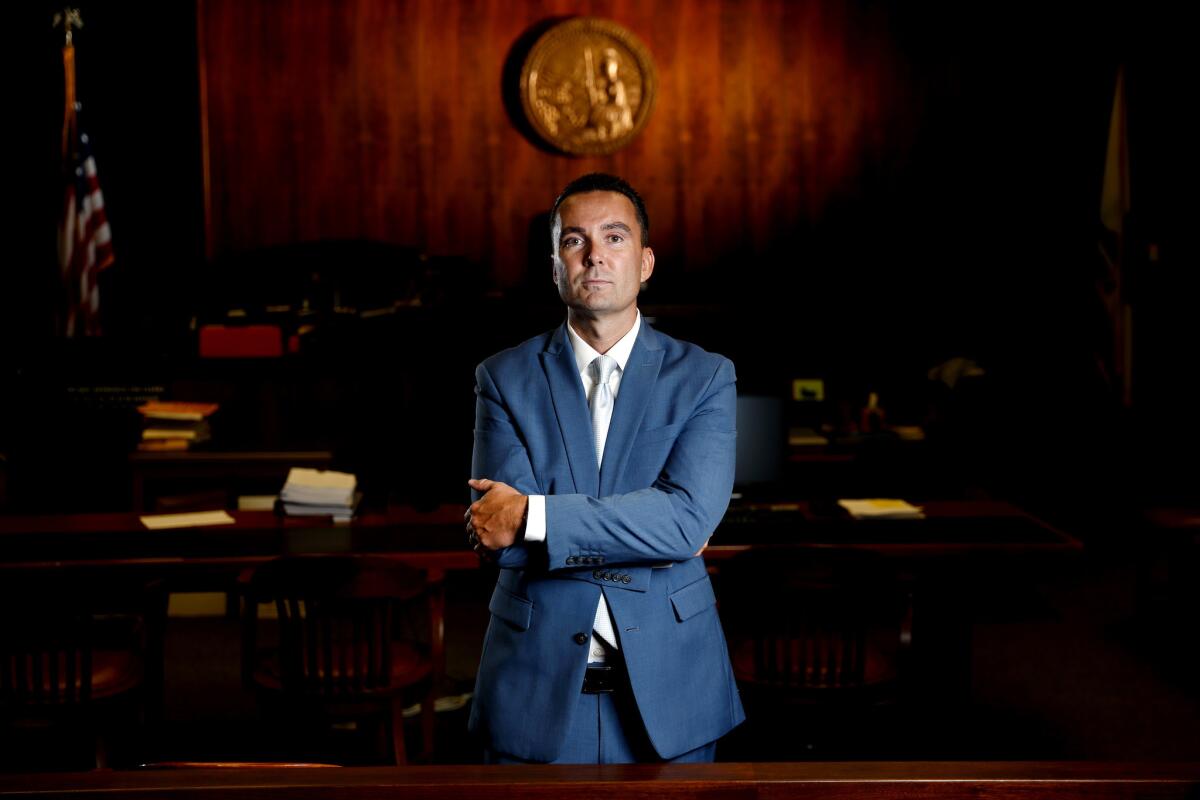Framed, Chapter 4: Prosecutors take on a legal power couple. Will they get justice?

CHAPTER FOUR: THE PROSECUTOR
The Orange County D.A.’s Special Prosecutions unit dealt with crimes of particular sensitivity — high-profile cases involving doctors and cops, lawyers and politicians.
Following the Framed series? Read it from the beginning >>
Christopher Duff, a career prosecutor in his early 40s, joined the team in the spring of 2012. Among the files that landed on his desk was a bizarre caper involving a pair of married Irvine attorneys suspected of planting drugs in a neighbor’s car.
Duff was struck by how thoroughly the Irvine police had investigated a crime in which the victim had suffered no physical harm. They had put 20 detectives on the case against Kent and Jill Easter at one time or another, and the lead investigator had spent six months on it exclusively.
Duff considered the possibilities. In so many places, he thought, it would have gone differently. If the attempted frame-up had happened in one of the gang neighborhoods of Los Angeles where he used to prosecute shootings, rather than in a rich, placid city in Orange County ... if the cop who found the stash of drugs in Kelli Peters’ car had been a rookie, rather than a sharp-eyed veteran … if she had been slightly less believable ...
It was easy to picture. Peters, the PTA president at her daughter’s elementary school, would have left the campus in the back of a patrol car, a piercing sight for the teachers who loved her and relied on her, for the parents who had entrusted their kids to her for years. It would have stolen not just her freedom but her name.
When Duff met Peters, she seemed raw-nerved and brittle, the kind of person who would be traumatized by a trip through jail. “It would have broken Kelli Peters,” he said. “I just know it.”
He also knew jurors would find Peters sympathetic. She was never far from tears when she talked about the Easters’ plot to destroy her, and the ways it had shaken her sense of security.
Duff was inheriting a case that had languished for more than a year, to the vocal frustration of Irvine cops. Duff’s office had battled in court for access to the Easters’ smartphones, whose contents were shielded by attorney privileges. What seemed to fuel the Easters’ sense of superiority — their status as lawyers — was now protecting them from the consequences of their crime, Duff thought.
Looking over the evidence, the prosecutor decided he had enough. He had their DNA on the pot pipe and painkillers planted in their victim’s car. He had motive and opportunity. He had incriminating smartphone pings. He had convicted killers on less.
***
The Easters expected a warning.
If charges were ever filed, their lawyers told them, the D.A.’s office had assured them of advance notice.
This would allow the Easters to surrender at an appointed time, with bail already arranged, and they could be in and out of booking quickly. They would avoid the pinch of handcuffs, a luxury available to people with money and good lawyers.
But Irvine police showed little inclination to minimize the Easters’ discomfort, and Duff said he was unaware of any surrender agreement.
In June 2012, police moved secretly under his direction. They obtained arrest warrants, careful not to record them in the public court computers.
***
Kent Easter had just dropped off two of his children at a tennis camp when the patrol car pulled him over near a busy intersection in Irvine. He was heading to work, to the Newport Beach office tower with his master-of-the-universe view on the 14th floor. He was in a suit, an equity partner, a high-dollar litigator. He had a deposition that day, and boxes of legal papers in the trunk.
Police called a tow truck for his Toyota Camry, handcuffed him and drove him to the county jail in Santa Ana. He was standing in the intake courtyard when he saw his wife, who had been arrested at their house, arrive in a squad car.
The Easters were being charged with conspiring to plant drugs in Peters’ car, the twisted culmination of a yearlong vendetta against the school volunteer. They were quickly out on bail, but their mug shots were all over the news.
No one had been killed, but something about the crime — the power and pettiness of the defendants, combined with the harmlessness of their victim — engendered a depth of indignation few cases matched. “Pure wickedness,” said one online commentator. “One of the most malicious things I’ve ever heard,” said another.
Orange County had long been dogged by images of rich and plastic people, the stereotypes fueled by the “Real Housewives” franchise with its rotating cast of socialites, their lives a whirl of feuds, shopping trips, personal trainers, lovers, plastic surgeons.
Now the Easters became symbols of this status-obsessed milieu at its most deranged, with an inexplicable crime that seemed to throb weirdly at the nexus of suburban psychosis and class privilege.
And it had happened in Irvine, no less — the county’s model, master-planned city — inviting people to contemplate the ugliness that seethed behind closed doors in places that overpromised order and niceness and green.
***
Kent Easter was told to clear out his law office at Stradling Yocca Carlson & Rauth. A human resources representative escorted him out of the Newport Beach building with his boxes, the detritus of a $400,000-a-year job.
It seemed inconceivable that he’d ever work for a top firm again — none could risk the publicity — but he might salvage a semblance of a career.
As the months passed, however, Duff won felony indictments against the Easters and showed no willingness to let them plead to misdemeanors, which might have allowed them to remain lawyers. This had far sharper urgency for Kent Easter, the family breadwinner, than for Jill Easter, whose license had been inactive for years.
DNA from both Easters had turned up on the planted drugs, but the weight of the evidence was stronger against husband than against wife. It was Kent who had been captured on tape making a phony call to police, implicating Peters. And it was Kent’s BlackBerry that had been pinging near Peters’ car when the drugs were planted.
But it was Jill Easter who took the blame for planting the drugs, in a declaration filed with the court and quickly sealed.
It was not a confession in the normal sense. It could not be used against her. It was offered for a narrow purpose — as part of an ingenious defense motion to try the Easters separately.
Her admission of guilt provided a strong legal basis for doing so.
Kent Easter would naturally wish to put her on the stand in his own defense, but couldn’t legally do so if they were put on trial together. He could if the trials were severed.
Superior Court Judge John Conley listened to the defense argument, and to the prosecutor’s impassioned opposition.
If the judge decided to split the trials, it was easy to envision calamity for the state’s case. The defense would push to have Jill Easter tried first, jurors wouldn’t hear her confession, and the relatively thin evidence against her — coupled with the skill of her attorney, Paul Meyer — would give her a plausible chance at acquittal.
Then she would take the stand at her husband’s trial, immune from the threat of jail. If she could testify credibly that she had planted the drugs, he would go free too. Game over.
It was a far-seeing strategy, equal parts cold logic and derring-do, but it had a flaw. First, the judge had to find Jill Easter’s confession believable. He seemed to have doubts.
Motion denied. The Easters would have to stand trial together.
***
By fall 2013, Duff was making final preparations for trial, papering his home and office with yellow Post-it notes on which he would scribble ideas at all hours. Then his telephone rang. It was Meyer. Jill Easter would agree to plead guilty to a felony count of false imprisonment by fraud or deceit.
This would spare her the humiliation of sitting through a trial and would also allow her to testify for the husband on whom she still depended financially.
The sentence — to begin after his trial — was 120 days in county jail. She would serve less than half, plus 100 hours at a Costa Mesa soup kitchen. She was promptly disbarred. Her Boalt Hall law degree was now useless.
BREAK
The Central Justice Center in Santa Ana was a sad wreck of a building, with overcrowded elevators, graffiti-scratched bathrooms and walls covered with fading portraits of former judges, retired or dead.
Into this setting, in November 2013, strode Kent Easter and his imposing defense team. It was headed by Thomas Bienert Jr., once Orange County’s top federal prosecutor. Two years earlier, Best Lawyers magazine had named him the county’s “White-Collar Lawyer of the Year.” In polish and pedigree, Bienert seemed more a creature of the federal courthouse down the block, a palace of domed ceilings, cherry wood paneling and honey-hued travertine.
From the witness stand, Kelli Peters faced jurors and recounted her experience, shaking with tears. She described being detained by police when they found drugs in her car at Plaza Vista School.
When Bienert questioned Officer Charles Shaver about that day, the defense attorney sought to minimize her ordeal. She wasn’t handcuffed, was she? No. Put in the squad car? No. Booked? No.
Duff counterattacked. To demonstrate how Peters had pleaded with Shaver not to arrest her, the prosecutor threw himself to his knees in front of the jury box, hands aloft beseechingly.
“She fell to her knees, crying, begging you, ‘please, please, please.’ Correct?”
“Yes,” Shaver said.
BREAK
Having failed to fend off arrest, job loss, indictment and trial, Kent Easter had one gambit left.
The successful litigator who had blazed through Stanford in three years would present himself as an emasculated patsy. His wife had berated him, deceived him, bludgeoned him with guilt.
“While Kent is a very good human being, he didn’t have a backbone when it came to his wife,” Bienert told jurors. “She wore the pants in the family. She pushed him around.”
How this might explain away the evidence against him wouldn’t be clear until the defendant himself took the stand.
Tall, composed and well-groomed, Easter looked confident as he raised his right hand. He swore to tell the truth. Finally, he said, he would get the chance to explain.
COMING FRIDAY: THE TRIAL
christopher.goffard@latimes.com
More to Read
Start your day right
Sign up for Essential California for news, features and recommendations from the L.A. Times and beyond in your inbox six days a week.
You may occasionally receive promotional content from the Los Angeles Times.







